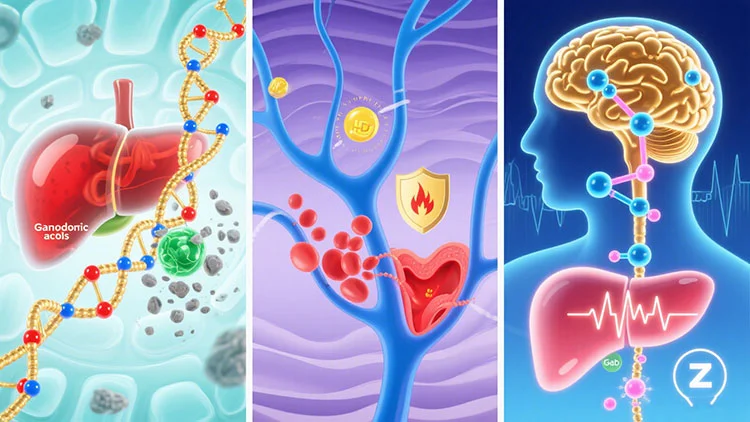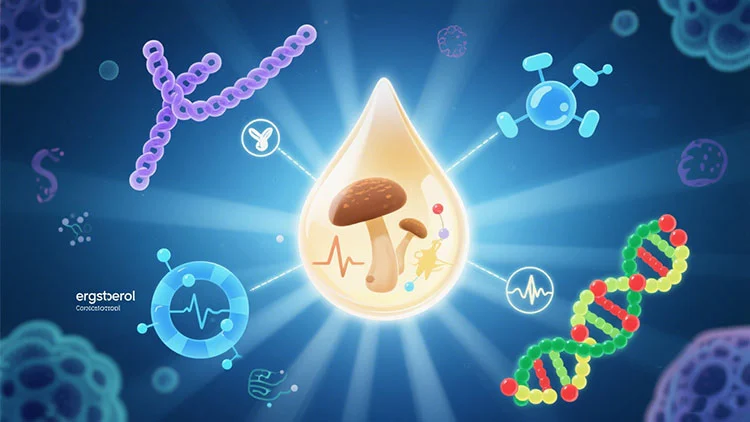What Active Compounds Define Reishi Mushroom Extract's Effects?
Reishi mushroom extract, which is made from Ganoderma lucidum, is known as the "king of herbs" in traditional Chinese medicine because of the extraordinary array of bioactive chemicals it contains. To fully grasp the reason for the ancient remedy's continued scientific acceptance in current health applications, one must be familiar with the exact active components that characterize the therapeutic actions of Reishi mushroom extract. Many bioactive components, including proteins, peptidoglycans, triterpenes, sterols, and polysaccharides, contribute to the many health advantages of the extract. These compounds, standardized typically between 10-50% polysaccharides in high-quality extracts, are responsible for the immune-modulating, adaptogenic, and health-supporting properties that have made Reishi mushroom extract a cornerstone of functional medicine and nutritional supplementation worldwide.
Which Polysaccharides in Reishi Mushroom Extract Provide Health Benefits?
Beta-Glucans: The Primary Immune Modulators
Because of its abundance of beta-glucans—specifically, beta-1,3-glucans and beta-1,6-glucans—reishi mushroom extract modulates the immune system. The body's defenses are bolstered when the immune system recognizes complex carbohydrate molecules, such as dectin-1 and complement receptor 3. Incorporating beta-glucans sourced from Reishi mushroom extract into one's diet may lead to a more robust and responsive immune system. Macrophages, NKT cells, and T-lymphocytes are all demonstrated to be activated more effectively by these beta-glucans. The molecular weight and structural configuration of these beta-glucans in Reishi mushroom extract are particularly important, as they determine the bioavailability and effectiveness of the immune-supporting effects. High-quality Reishi mushroom extract products maintain the integrity of these polysaccharide structures through careful extraction processes, ensuring maximum therapeutic potential for users seeking natural immune system support.
Heteropolysaccharides and Their Unique Properties
The many health benefits of the Reishi mushroom extract are due in large part to the presence of heteropolysaccharides, which are added to the beta-glucans. Each of these polysaccharides has its own specific action mechanism. There is comprehensive support for cellular health and metabolic activity provided by the complex sugar molecules called galactans, mannans, and xylans. Heteropolysaccharides found in reishi mushroom extract have antioxidant properties. These properties help to counteract oxidative stress and free radicals, two potential causes of aging and other health issues. Additionally, these compounds help regulate the ratio of beneficial to detrimental inflammation by promoting optimal inflammatory responses. Quality Reishi mushroom extract products have standardized polysaccharide content, which means that customers may expect consistent delivery of these beneficial substances. This means that frequent supplementation will reliably enhance their health.
Water-Soluble vs. Alcohol-Soluble Polysaccharides
The extraction method used to produce Reishi mushroom extract significantly influences which polysaccharides are preserved and concentrated in the final product. Water-soluble polysaccharides, primarily the beta-glucans, are typically extracted through hot water extraction methods and represent the most studied and well-understood components of Reishi mushroom extract. These compounds are readily absorbed by the digestive system and quickly enter the bloodstream to exert their immune-supporting effects throughout the body. Alcohol-soluble polysaccharides, while present in smaller quantities, contribute unique properties to Reishi mushroom extract that complement the water-soluble fractions. Reishi mushroom extricate may have indeed more restorative esteem when extricated utilizing present day strategies that combine water and liquor extraction. These strategies keep up a more prominent range of polysaccharides, coming about in a more careful extricate. The dark powder appearance of high-quality Reishi mushroom extricate is a result of the nearness of both sorts of polysaccharides as well as other bioactive components that contribute to the extract's color and viability.

How Do Triterpenes in Reishi Mushroom Extract Affect the Body?
Ganoderic Acids: The Liver-Protective Compounds
The hepatoprotective and cholesterol-modulating properties of Reishi mushroom extract are greatly enhanced by ganoderic acids, one of the most notable and important groups of triterpenes identified in the extract. Reishi mushroom extract has its signature bitter flavor from these special chemicals, of which there are more than 130 types in Ganoderma lucidum. The liver's health and function are both enhanced by these substances. Reishi mushroom extract contains ganoderic acids, which may protect cells from oxidative stress, inflammation, and pollution; this might be an all-natural approach to liver strength. Hepatoprotective properties of these triterpenes are due to their ability to improve the liver's detoxification processes, aid in the creation of antioxidant enzymes, and support healthy cell regeneration in the liver. The delicate triterpenes are retained in high-quality Reishi mushroom extract products by careful processing and standardization, ensuring stable levels of these key bioactive compounds.
Triterpenoids and Cardiovascular Health
Reishi mushroom extract contains triterpenoid chemicals that may help maintain healthy cardiovascular function via a number of different pathways. Various ganoderic acids and lucidenic acids are among these compounds. These compounds offer assistance keep cholesterol levels customary by expanding the extent of great cholesterol (HDL) to awful cholesterol (LDL) and triglycerides. Considers have appeared that reishi mushroom extricate, which is wealthy in triterpenoids, may make strides lipid profiles and bolster heart wellbeing. These chemicals may too offer assistance keep up sound blood weight by supporting ordinary vascular work and advancing sound circulation all through the body. The triterpenoids in reishi mushroom extract also have anti-inflammatory characteristics, which may help shield the cardiovascular system from inflammation, which is becoming more and more recognized as a risk factor for cardiovascular disease. The concentration and bioavailability of these triterpenoids in Reishi mushroom extract products depend heavily on the quality of the raw materials and the sophistication of the extraction processes used during manufacturing.
Adaptogenic Properties of Triterpenes
Because of its high concentration of triterpenes, reishi mushroom extract is well-known for its adaptogenic effects, which improve the body's ability to deal with emotional, mental, and physical stress. In order to regulate the body's crucial push reaction instrument, the hypothalamic-pituitary-adrenal (HPA) pivot, these substances aid. This allows for more regulated and appropriate responses to stretch. When taken regularly, the adaptogenic triterpenes found in reishi mushroom extract may help with energy, fatigue, and stress-related illnesses. Many individuals who use reishi mushroom extract report improved sleep and an overall increase in their quality of life. It has a variety of adaptogenic capabilities, including the potential to modulate mood and sleep quality. Neurotransmitter systems, including the GABA and serotonin pathways, may be affected by the triterpenes present in reishi mushroom extract. Mood and stress management rely on these systems. The standardization of triterpene content in quality Reishi mushroom extract products ensures that users receive consistent levels of these important adaptogenic compounds, making it possible to experience reliable stress-supporting benefits from regular supplementation.

What Other Bioactive Compounds Make Reishi Mushroom Extract Unique?
Peptidoglycans and Immune System Modulation
The immune-modulating effects of reishi mushroom extract are due in large part to peptididoglycans, a family of bioactive chemicals that differs from triterpenes and polysaccharides but is nevertheless present. There is mounting evidence that these chemicals, which consist of several chains of carbohydrates and peptides, enhance immune function. Increasing antibody synthesis and activating complement mechanisms are two ways they do this. A study found that the peptidoglycans in reishi mushroom extract may improve the immune system's ability to recognize and respond to pathogens while maintaining tissue tolerance. The immune system is supported by the combination of peptidoglycans and polysaccharides found in reishi mushroom extract. When used together, these two components outperform their individual counterparts. Inhibiting autoimmune illnesses and chronic inflammation, these substances regulate the immune
Sterols and Hormonal Balance
Supporting hormonal balance and general endocrine system function, Reishi mushroom extract contains sterol components including ergosterol and other fungal sterols. Important signaling molecules and hormones are produced and controlled by the body in a natural way; these substances may act as their building blocks. It is possible that the sterols included in reishi mushroom extract might help men control their testosterone levels. Their energy, mood, and general vigor may all increase as a result, the research found. Proper regulation of stress reactions and circadian rhythms relies on normal cortisol patterns, which these chemicals may potentially amplify. There are anti-inflammatory properties in the sterols found in reishi mushroom extract. Because chronic inflammation may interfere with hormone function, this suggests it may assist improve overall health. Reishi mushroom extract products include sensitive sterol components that must be handled and processed with extreme care in order to preserve their bioactivity and therapeutic potential.
Proteins and Amino Acids with Therapeutic Properties
The health benefits of reishi mushroom extract are due to the several action pathways that are supported by the abundance of proteins and amino acids included in the extract. There are lectins and immunomodulatory proteins in the extract that make the polysaccharides and triterpenes even more effective biologically. Immune system support against many illnesses may be possible with the use of reishi mushroom extract, which includes proteins with antibacterial and antiviral properties. Overall health and wellbeing are promoted by reishi mushroom extract, which contains both necessary and non-essential amino acids. A number of biological activities rely on these amino acids, including metabolism and the synthesis of neurotransmitters. Research has shown specific bioactive peptides in Reishi mushroom extract, in addition to the well-documented advantages on energy, mood, and cognitive function. You get even more bang for your buck from the nutritional bang and the added therapeutic benefits of the protein in premium Reishi mushroom extract products.
Conclusion
The wide assortment of dynamic components found in reishi mushroom extract—which incorporates proteins, peptidoglycans, triterpenes, and polysaccharides—makes it a capable common wellbeing supplement with a few restorative applications. Learning what makes Reishi mushroom extricate so compelling can offer assistance clarify the adaptogenic herb's persevering ubiquity and the proceeded backing it gets from logical communities.
For premium-quality Reishi mushroom extract standardized for optimal bioactive compound content, Shaanxi SCIGROUND Biotechnology Co., Ltd. offers professionally manufactured products backed by decades of expertise and rigorous quality standards. Contact us at info@scigroundbio.com to discover how our scientifically-formulated Reishi mushroom extract can support your health and wellness goals.
References
1. Boh, B., Berovic, M., Zhang, J., Zhi-Bin, L. (2007). Ganoderma lucidum and its pharmaceutically active compounds. Biotechnology Annual Review, 13, 265-301.
2. Wachtel-Galor, S., Yuen, J., Buswell, J.A., Benzie, I.F. (2011). Ganoderma lucidum (Lingzhi or Reishi): A medicinal mushroom. In Herbal Medicine: Biomolecular and Clinical Aspects, 2nd edition. CRC Press/Taylor & Francis.
3. Xu, Z., Chen, X., Zhong, Z., Chen, L., Wang, Y. (2011). Ganoderma lucidum polysaccharides: immunomodulation and potential anti-tumor activities. American Journal of Chinese Medicine, 39(1), 15-27.
4. Sliva, D. (2003). Ganoderma lucidum (Reishi) in cancer treatment. Integrative Cancer Therapies, 2(4), 358-364.
5. Zhou, X., Lin, J., Yin, Y., Zhao, J., Sun, X., Tang, K. (2007). Ganodermataceae: natural products and their related pharmacological functions. American Journal of Chinese Medicine, 35(4), 559-574.
6. Sanodiya, B.S., Thakur, G.S., Baghel, R.K., Prasad, G.B., Bisen, P.S. (2009). Ganoderma lucidum: a potent pharmacological macrofungus. Current Pharmaceutical Biotechnology, 10(8), 717-742.